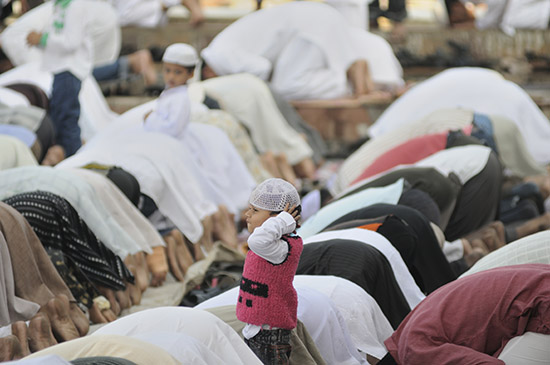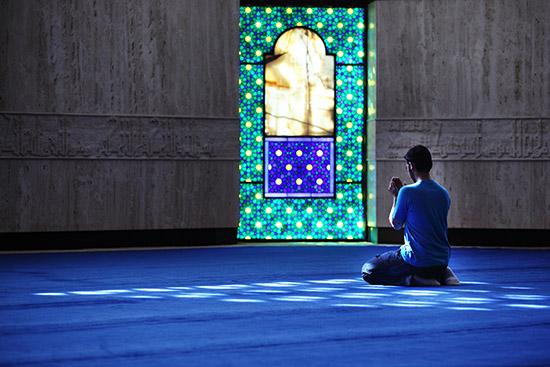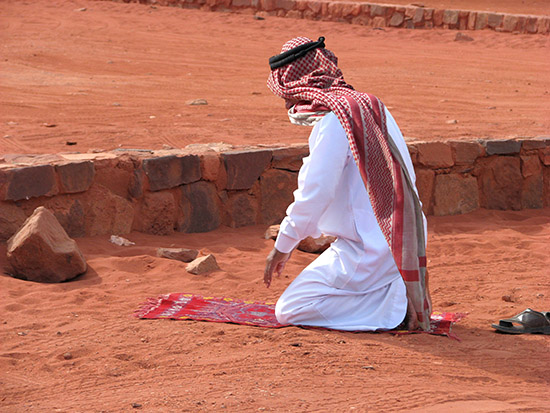Current Section: model

Lesson The Reality of Worship
Worship: a comprehensive name for all that Allah Almighty loves and is pleased with in terms of words and actions, both inward and outward. All that Allah loves in terms of words and deeds is considered worship.

The reality of worship
Worship is absolute obedience with love, veneration, and submission, and it is Allah’s right over His servants. It is exclusive to Him alone and no one else. It includes all that Allah loves and is pleased in terms of words and actions that He commands people, whether they are outward actions such as prayer, zakat and Hajj, or inward actions, such as remembrance of Allah in the heart, fear of Him, reliance upon on Him, seeking help from Him, and other things.
It is from Allah’s mercy to His servants that He has made different kinds of acts of worship for them, including:
It is from the wisdom of Allah Almighty that He made the acts of worship diverse and numerous so that each of us finds in himself the activity and enthusiasm for worship, and does not get bored or tired; it also so that a person chooses the form of worship that he feels drawn towards.

Just as acts of worship vary, people also vary in their inclinations and abilities. Some of them find themselves active and earnestness in one form of worship over another. Someone could be drawn to kindness toward people, while another drawn to increased voluntary fasting, while another can become attached to reading the Quran and memorizing it.
The Prophet ﷺ said: “The one who prays constantly will be called from the Gate of Prayer. The one who is eager in fighting in the cause of Allah, will be called from the Gate of Jihad. The one who spends constantly in charity will be called from the Gate of Charity. The one who regularly fasts will be called from the Gate of Ar-Rayyan." Abu Bakr said: "O Messenger of Allah! Those who are called from any of these gates will stand in need of nothing. Will anybody be called from all of those gates?" The Messenger of Allah ﷺ replied, "Yes, and I hope that you will be one of them.” (Al-Bukhari 1897, Muslim 1027).
Worship includes all the actions of the believer if he intends to draw closer to Allah through them. For worship in Islam is not limited to the known rites of worship such as prayer, fasting, and the like. Rather, all beneficial deeds coupled good and proper intention become acts of worship that will be rewarded. If a Muslim ate or drank or slept in order to achieve piety in obedience to Allah Almighty, he is rewarded for that.

A Muslim lives his whole life for Allah. He eats to strengthen his body to be in obedience to Allah. His eating with this intention becomes worship. He marries to protect himself from what is forbidden, so his marriage becomes worship. And with a similar intention, his business, his job, and his livelihood turn into worship. With the right intention, his learning of knowledge, research, discovery, and invention become acts of worship. The woman’s care for her husband, children, and home becomes worship. And all areas of life and their various actions and beneficial affairs can be considered worship as long as all of that is accompanied by a good intention.
Worship is the wisdom behind creation:
Allah the Exalted said: {And I did not create the jinn and mankind except to worship Me. • I do not want from them any provision, nor do I want them to feed Me. • Indeed, it is Allah who is the [continual] Provider, the firm possessor of strength} (Adh-Dhariat:56-58).
Allah the Glorified said that the wisdom behind the creation of the jinn and humans is their worship of Allah. Allah does not need their worship, but rather they are in need of worshiping Him, because of their dire need for Allah Almighty.
And if a person neglects that goal and immerses himself in the pleasures of this world without remembering the divine wisdom of his existence, he turns into a creation that has no privilege over the rest of the creatures of this planet. Animals also eat and play, even if they are not held accountable in the Hereafter, unlike humans. Allah the Exalted said: {And those who disbelieve enjoy themselves and eat as grazing livestock eat, and the Fire will be a residence for them} (Muhammad:12). They resemble animals in their actions and goals, except that they will receive their recompense for this. Because unlike animals, they have minds that understand and perceive, unlike animals that do not understand.
The worship that Allah commanded is based on three important pillars, each one complementing the other

Pillars of Worship
The worship that Allah has imposed on His servants must include complete humility, submission to Allah, and fear of Him, along with complete love, desire, and hope towards Him.
Based on this, love that is not accompanied by fear or humility, such as the love of food and money, is not worship. Likewise, fear without love---such as fear of a predatory animal or an unjust ruler---is not considered worship. When fear, love, and hope come together in a good deed, it is worship. And worship cannot be for anyone else except for Allah alone.
So if a Muslim prays or fasts and is motivated by the love of Allah and the hope of His reward, and the fear of His punishment, he is in worship. But if he prays so no one says that he doesn't pray, or fasts to preserve his health, it does not constitute worship.

Allah the Exalted praised his prophets, saying: {Verily, they used to hasten to good deeds and supplicate to Us in hope and fear, and they were to Us humbly submissive.} (Al-Anbiya:90)
Types of worship:
1. Pure worship:
These are words and actions that Allah and His Messenger have commanded to be performed in a specific way. It is an act that can only constitute as worship, such as: prayer, fasting, pilgrimage, supplication, circumambulation of the Kaaba (tawaf), and the like. It is not permissible to direct these acts of worship to anyone other than Allah, nor to seek reward for them from other than Him.
2. What becomes worship with intention
These include an upright character which Allah commanded and directed people toward. This includes honoring one’s parents, doing good to people, supporting the oppressed, and other noble habits and manners that Allah commanded in general terms. A Muslim falls into sin if he leaves this. It is not necessary for this type of worship to follow the Prophet ﷺ in specific detail. Instead, it is sufficient to avoid violating this conduct to avoid falling into prohibited behavior.
If the doer of these actions accompanies them with a good intention, specifically aiming for obedience of Allah through them, they will be rewarded. If these deeds are done without intending to do them for the sake of Allah, the doer will not be rewarded. But he will not be sinful for this. These forms of worship include worldly matters of everyday life, such as sleep, work, business, sports, and so on. Every useful deed intended for the sake of Allah Almighty will lead to the doer being rewarded: {Indeed, We will not allow to be lost the reward of any who did well in deeds} (Al-Kahf:30).
For worship to be considered correct and acceptable, two conditions must be fulfilled:
Allah said: {So whoever hopes for the meeting with his Lord - let him do righteous work and not associate in the worship of his Lord anyone} (Al-Kahf:110)
His saying: {not associate in the worship of his Lord anyone} indicates the devotion of worship to Allah alone, to the exclusion of anything else. And His saying: {righteous work} indicates that it is following the Sunnah because a righteous deed necessitates correctness, which requires its compliance with the Sunnah of the Prophet ﷺ. Thus, whoever desires Allah and the abode of the hereafter must worship Allah according to these two conditions mentioned in the verse.


